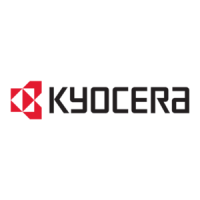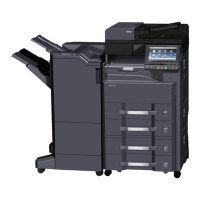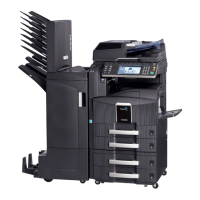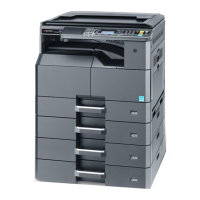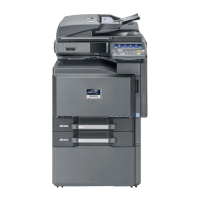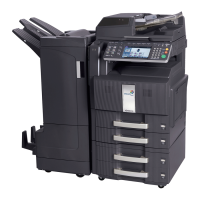Do you have a question about the Kyocera TASKalfa 4002i and is the answer not in the manual?
Provides cautions for handling consumables and other essential safety precautions before operating the machine.
Details the limited warranty terms and conditions for the multifunctional product and accessories in the US and Canada.
Contains legal information regarding copying, reproduction, trade names, and software licenses.
Explains the Low Power Mode, Sleep Mode, and automatic power-off timer functions to reduce energy consumption.
Identifies and labels the external components of the machine for user reference.
Provides instructions on how to connect LAN and USB cables for machine setup.
Explains the operation panel keys, touch panel, and how to navigate the machine's interface.
Details how to configure wired and wireless network connections for the machine.
Guides on installing printer drivers and software utilities from the DVD for Windows and Mac.
Explains how to access and utilize the Command Center RX for machine management and settings.
Provides instructions and precautions for loading various types of paper into the machine's paper feeders.
Details how to add contacts and groups to the machine's address book for sending functions.
Explains the various tabs and settings within the printer driver for print-related configurations.
Guides on registering and printing with custom paper sizes not included in standard options.
Details how to save and print jobs using the Job Box, Private Print Box, and other storage options.
Explains how to access and interpret the Status Monitor for checking printer status and job progress.
Provides guidance on correctly placing various types of originals on the platen or in the document processor.
Explains how to register, recall, edit, and delete preset function programs for efficiency.
Details the basic operations for making copies, including proof copy and interrupt copy functions.
Guides on scanning documents using TWAIN or WIA compatible applications.
Describes various scanning and sending methods like WSD Scan, DSM Scan, and File Management Utility.
Explains the functionalities of Custom Box, Job Box, Removable Memory Box, and Fax Box for data storage.
Provides instructions for printing documents from and saving scanned documents to USB memory.
Provides an overview of the machine's functions, categorized by tabs like Org./Paper/Finishing and Image Quality.
Details the various settings and functions available for copying documents.
Explains the settings for configuring original type, file format, and sending options.
Covers configuring settings for storing documents, including original size, density, and file format.
Explains how to scan documents of different sizes together, with options for copying and sending.
Details how to create booklets from sheet originals by folding and stapling.
Explains how to produce two-sided copies from one-sided or two-sided originals.
Guides on how to add text stamps, including position, font, and color settings.
Explains how to specify image file formats like PDF, TIFF, JPEG, and XPS, including quality settings.
Describes how to check the status of jobs being processed or waiting, including print, send, and store jobs.
Explains how to view job histories for print, send, store, and fax jobs.
Covers operations like pausing, resuming, canceling jobs, and priority override for waiting jobs.
Explains how to check the status of installed devices and communication lines.
Explains how to navigate and use the system menu for overall machine operation configuration.
Covers common machine settings such as language, default screen, sound, and keyboard layout.
Details settings for originals and paper, including custom sizes, media types, and default paper sources.
Describes how the machine handles errors like duplexing, finishing, or paper jams, and available actions.
Explains how to set default values for various functions like orientation, image quality, and zoom.
Covers configuration settings for the machine's home screen, including desktop and taskbar customization.
Explains settings for copying functions such as paper selection, auto rotation, and preset limits.
Details settings for sending functions, including quick setup registration and destination check.
Covers settings for Custom Box, Job Box, Sub Address Box, and Polling Box.
Explains machine system settings, including network configuration and security settings.
Provides instructions for configuring TCP/IP (IPv4 and IPv6) settings for wired network connections.
Details how to configure Wi-Fi Direct settings for connecting computers and handheld devices.
Covers security settings like SSL, proxy, Ping, and restarting the network.
Explains settings for data security, including initialization, overwrite methods, and password customization.
Explains how user access is administered on the machine and the different security levels.
Details how to enable user login administration using local or network authentication methods.
Covers registering, altering, and deleting users, and configuring authentication and password policies.
Provides steps to add new users to the local user list, including their properties and access levels.
Explains how users can change their own properties like user name, password, and email address.
Details how to manage users who print from a PC using the printer driver settings.
Guides on managing users for scanning via TWAIN, including setting up the TWAIN driver.
Explains how to manage users for scanning via WIA, including setting up the WIA driver.
Describes how to set usage authority for each user and configure restriction items.
Explains how to set restrictions for machine usage by individual groups registered in the authentication server.
Details how to set functions that guest users can use when User Login Administration is enabled.
Guides on obtaining network user property from the LDAP server for user information display.
Explains how to enable simple login by selecting a user name, and configuring associated settings.
Details authentication types when ID card authentication is enabled, including keyboard login.
Explains how to set up PIN code authorization, requiring network authentication and Ext. server type.
Covers procedures for login and logout when job accounting is enabled.
Explains how job accounting manages counts by assigning IDs to accounts for copy, print, scan, and FAX.
Guides on how to enable job accounting and configure the settings.
Details how to configure access to job accounting, selecting between local and network authentication.
Covers adding, changing, and deleting accounts, and setting restrictions for each account.
Explains how to count pages printed, classified by total job accounting and each job accounting.
Guides on printing accounting reports to check machine settings, status, and history.
Explains procedures for login and logout when job accounting is enabled.
Provides guidance on cleaning the machine, replacing consumables like toner and waste toner box.
Details the procedure for replacing staples in the inner finisher unit.
Offers step-by-step instructions for removing jammed paper from various locations in the machine.
Provides procedures for clearing staple jams from the inner, 1,000-sheet, 4,000-sheet, and folding units.
Offers general guidelines for problem-solving, categorized by symptom and checkpoints.
Addresses issues related to machine operation, such as applications not starting or screens not responding.
Helps diagnose and resolve issues with printed image quality, like light or dark printouts.
Provides guidance on responding to various messages displayed by the machine.
Covers procedures for adjusting print quality and performing machine maintenance, like tone curve adjustment.
Provides an overview of the optional equipment available for the machine, including document processors and finishers.
Lists and describes the optional applications that can be installed to expand machine functionality.
Explains how to enter characters using the on-display keyboard for names and settings.
Details paper sizes, types, and specifications, including basic and special paper requirements.
Lists the technical specifications for the machine, copy functions, printer functions, and optional equipment.
Provides definitions for technical terms and features used throughout the manual.
| Print Technology | Laser |
|---|---|
| Print Speed | 40 ppm |
| Resolution | 1200 x 1200 dpi |
| Maximum Paper Capacity | 7, 150 sheets |
| Duplex Printing | Yes |
| Memory | 2 GB |
| Monthly Duty Cycle | 150, 000 pages |
| Standard Output Capacity | 250 sheets |
| Wi-Fi | Optional |
| Functions | Print, Copy, Scan, Optional Fax |
| Copy Speed | 40 cpm |
| Copy Resolution | 600 x 600 dpi |
| Scan Resolution | 600 x 600 dpi |
| Fax Transmission Speed | 33.6 kbps |
| Operating System Compatibility | Windows, Mac OS, Linux |
| Maximum Memory | 4 GB |
| Hard Disk | 320 GB |
| Processor Frequency | 1.2 GHz |
| Ethernet LAN | Yes |
| Mobile Printing Technologies | AirPrint, Mopria |
